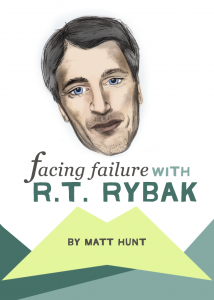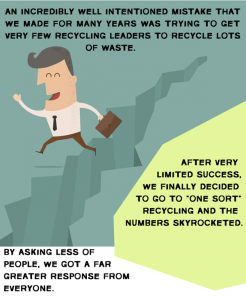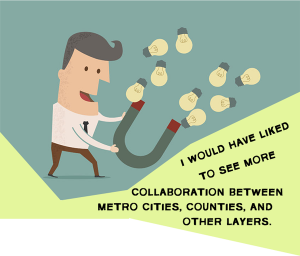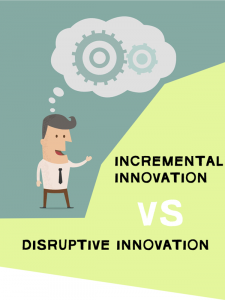Last year I began writing an online column for Pollen titled Facing Failure as an effort to spark a discussion on the importance of failure in driving innovation in the non-profit, education, and government sectors. Most of us would prefer to avoid failure and the pain that it can cause but to truly create something new mistakes will need to be made along the way. In politics, a “failed” initiative can quickly sabotage a political career which is why most politicians are quick to dismiss or gloss over their shortcomings. But there are some politicians are trying to reframe the discussion with candor and transparency. I am excited to share my recent interview with one such politician, former Minneapolis Mayor R.T. Rybak.
[This interview was originally published on July 1st, 2014 in the online publication Pollen]
On Failure with Former Minneapolis Mayor, R.T. Rybak
 In business, failure might cost you your bonus, that promotion, or even your job. But in the world of public politics, a failure can quickly cost you your career. Executives and politicians alike prefer to distance themselves from failures. When they do recognize a shortcoming, they cite the myriad of external factors that led to the failure as they brush it aside and head in the other direction. Not until an executive or politician has left the arena will they usually disclose their political imperfections.
In business, failure might cost you your bonus, that promotion, or even your job. But in the world of public politics, a failure can quickly cost you your career. Executives and politicians alike prefer to distance themselves from failures. When they do recognize a shortcoming, they cite the myriad of external factors that led to the failure as they brush it aside and head in the other direction. Not until an executive or politician has left the arena will they usually disclose their political imperfections.
In discussions with insiders from the Minnesota political arena, I often hear former Minneapolis mayor R.T. Rybak described as “a different breed.” Maybe it has something to do with the fact that he has been known to stage dive into concert crowds. Maybe it’s because he led the city forward in a true partnership between the community and local businesses. Or just maybe it’s because he changed the conversation with the electorate by frequently being out with constituents in the community, being more transparent with his policies, and in asking for voters to trust him in innovating government.
In a previous Pollen article (Mistakes vs. Failures), I shared my preferred distinction between a mistake and a failure in driving innovation. A mistake is an incorrect, unwise, or unfortunate decision caused by bad judgment, lack of information, or a lack of attention. A failure is simply lack of success—when something you were trying to accomplish fell short of what was required or projected. The important part is that mistakes don’t always have to end in failure and failures aren’t always caused by mistakes. The following is from a recent interview with former Minneapolis mayor R.T. Rybak on the importance of innovation in government, the risks involved, and the role of failure in the process.
MATT HUNT: In your 12 years as Minneapolis mayor, you’ve had some pretty good successes. You cite the city’s STEP-UP Summer Jobs Program, the Midtown Exchange, the Midtown Global Market, and the improved bond rating as a few of accomplishments that you’re most proud of. Of all your successes as mayor, which do you feel were the most innovative initiatives?
R.T. Rybak: There were a few that come to mind.
One initiative that took an active role in changing our community was the STEP-UP Summer Job Program. With that program, we were able to raise a lot of private money and get businesses to participate. We turned a deficit as an asset. I am proud of what we accomplished with the program and that it was a great sales pitch—we have had over 18,000 thousand participants so far and it will be over 20,000 by the end of the summer.
We very rarely get credit for infrastructure projects but when I became mayor, I had inherited a big problem. At the time, during heavy storms, raw sewage drained into the Mississippi. I was told that solving the problem would involve many millions in infrastructure. We took a comprehensive approach by disconnecting the storm sewers from the sanitation sewers and by purposefully creating a lot more water-permeable land. We added green rooftops onto the downtown Minneapolis Central Library and Target Center which I took plenty of political flack for. But the green roof on Target Center can now absorb more than 1 million gallons of water per year.
 An incredibly well intentioned mistake that we made for many years was trying to get very few recycling leaders to recycle lots of waste. After very limited success, we finally decided to go to “one sort” recycling and the numbers skyrocketed. By asking less of people, we got a far greater response from everyone.
An incredibly well intentioned mistake that we made for many years was trying to get very few recycling leaders to recycle lots of waste. After very limited success, we finally decided to go to “one sort” recycling and the numbers skyrocketed. By asking less of people, we got a far greater response from everyone.
Finally, I would have to say that our Minneapolis 311 system was one of our most innovative initiatives. The system addressed the single biggest issue—residents wanted to be able to figure out who was in charge and how to get something fixed. One example of how it worked well was with public graffiti. The single biggest complaint to our office was reporting public graffiti. When the 311 team worked on the script for reporting this problem, they recognized that seven different parties were involved. So instead of taking the call and passing it on to those parties, the team eventually rewrote the process with just one person in charge. The initiative forced us to reinvent the systems behind it—we didn’t just want a phone system.
MH: There seems to be a growing consensus that we need to innovate more in the public sector if we are going to move our city, state, or country forward. But unlike the private sector where the risk of failure is understood as part of the innovation process, there seems to be little tolerance for “failure” in public sector. Do you agree? If so, how did you find balance in this paradox as mayor?
 R.T.R: Yes, I agree. The reality is that it is pretty tough to run re-election if you made a mistake. I had the luxury of coming into the job of mayor in the middle of financial crisis for the city. Not changing wasn’t an option. The status quo wasn’t an option. I had a lot of support to take action. I do think that one of my biggest regrets was that we weren’t able to do more to eliminate more layers of government. There are many important roles of government but we have much more than we can afford. I would have liked to see more collaboration between metro cities, counties, and other layers.
R.T.R: Yes, I agree. The reality is that it is pretty tough to run re-election if you made a mistake. I had the luxury of coming into the job of mayor in the middle of financial crisis for the city. Not changing wasn’t an option. The status quo wasn’t an option. I had a lot of support to take action. I do think that one of my biggest regrets was that we weren’t able to do more to eliminate more layers of government. There are many important roles of government but we have much more than we can afford. I would have liked to see more collaboration between metro cities, counties, and other layers.
Another thing that I learned during my time is as mayor was that there were times when spending more in year one can save you more in year two and beyond. But that is a very difficult balance in tough times because the more you spend would have equaled less police or firefighters. We need more politicians willing to have that difficult discussion.
MH: In the private sector, there is a distinction between incremental innovation (i.e. General Mills introducing a new flavor of Cheerios) and disruptive innovation (i.e. Dayton Hudson launching a new discount concept called Target). Do you think there is a role for both kinds of innovation in the public sector? If so, where do you most see the need for disruptive innovation today?
 R.T.R: Yes, we absolutely need both. I feel that the public does have more of an appetite for being a partner in solving these big problems. I saw more acceptance from voters for big sweeping changes that caused some inconvenience than for more subtle changes with less inconvenience that did not resolve the issue. My recycling story was an example of this.
R.T.R: Yes, we absolutely need both. I feel that the public does have more of an appetite for being a partner in solving these big problems. I saw more acceptance from voters for big sweeping changes that caused some inconvenience than for more subtle changes with less inconvenience that did not resolve the issue. My recycling story was an example of this.
As for where we need disruptive innovation—the single biggest thing is businesses getting ready for the coming worker shortage. From our last budget, we identified money for a work transition plan that was envisioned as an adult version of the STEP-UP Program [called] Urban Scholars. We need a solution that can get more able bodies into the workforce. I was able to help lay out the strategy but wasn’t able see it through as mayor.
MH: Last year we saw a major innovation in the way average Americans get healthcare coverage with the Affordable Care Act. The introduction of healthcare exchanges was publicly criticized for a tragically poor implementation. This issue eventually became a political lightning rod at both the state and national level. In the zero-sum game of politics, few politicians seem to have the political will to take on these large complex problems. Are we then bound to mostly incremental solutions? Is there a better way?
R.T.R: I believe that we get the politics that we deserve. If we are going to continue to see cartoons instead of looking at the facts, then we are not going to solve these problems. The truth is that 7 million more Americans have healthcare. I think that the tide is turning on this issue. There is a huge problem and politicians need to have the guts to stand up for what they know is right. It is imperfect but it is better than the status quo.
MH: Few voters remember that in 2001, Minneapolis was in serious financial trouble and its bonds had been devalued. Under your leadership, the city paid off millions in debt and worked to reform pensions. In 2013, we witnessed the first failure of a major American city when Detroit filed for Chapter 9 bankruptcy protection. Did your team study Detroit’s failure to learn from their mistakes? Were there any lessons learned?
R.T.R: We knew early on that we needed to get our financial house in order and we made hard decisions to pay down more than $100 million dollars of debt. I have known the last two mayors of Detroit and what has happened to that city is tragic. To be honest though, I think we have learned more from other cities like ours that didn’t respond as fast to the financial crisis. We were able to come together and respond quickly. There are times to cut spending, there are times to invest, and there are times to reform—and sometimes you need all three. The good news is that we took action to ensure that what happened to Detroit won’t happen to us.
 MH: In a 2013 interview, you mentioned that “a lot of people in public roles […] seem to put on a public façade.” How much of this façade do you think is to protect a candidate from his or her own shortcomings? Do you think the Minnesota electorate will stand behind a candidate who is humble enough to admit his or her failures?
MH: In a 2013 interview, you mentioned that “a lot of people in public roles […] seem to put on a public façade.” How much of this façade do you think is to protect a candidate from his or her own shortcomings? Do you think the Minnesota electorate will stand behind a candidate who is humble enough to admit his or her failures?
R.T.R: I suppose some politicians see the need to obscure the truth. I was the opposite. I give the electorate more credit. I tried to give them more information and more transparency; letting the chips fall where they may. I believe that authenticity is the best political weapon.
MH: Were there any initiatives that you undertook as mayor that you would consider a failure? Looking back are there things that you would have done differently?
R.T.R: Not everything worked like I wanted it to but the one issue I felt had the most work left to do was with our schools. That is the reason why I wanted to take the job at Generation Next.
MH: You’ve mentioned that you’re interested in potentially running for governor in 2018 and you’ve stated that you didn’t think that you were going to win your first election as mayor. If you do decide to run, what odds would you give yourself for success?
R.T.R: Honestly, I haven’t thought that much about it and probably won’t for a few years.
While we might not all agree on whether we need less government or more government, it’s easier to agree that we need effective government. Many cities and states have recognized the need to build repeatable innovation processes in order to deliver more effective government services. A few years ago, Harvard’s Kennedy School of Government published their list of “Top 25 Innovations in Government” from more than 500 applications. Most of the innovations would be considered incremental but a few of them were disruptive.
Just as in the for-profit business sector, we need our government to seek both incremental innovation projects and disruptive innovation initiatives. To do this, we need an electorate that recognizes that “innovation perfection” doesn’t exist. The truth is that mistakes will be made along the way and sometimes we will need to start over. We also need a breed of politician who have the courage to lead these pilot programs and the conviction to be transparent with the results. If we cannot build in a tolerance for potential “innovation failure” into our political process, then we are indeed bound to get the government that we deserve.
I’d like to thank former Mayor Rybak for his time, his courage, and his conviction—he truly is a different breed.
Food for thought:
Images: Courtesy Pollen at www.bepollen.com
Receive periodic email updates from Matt Hunt including his published pieces, updates on his progress, and more!